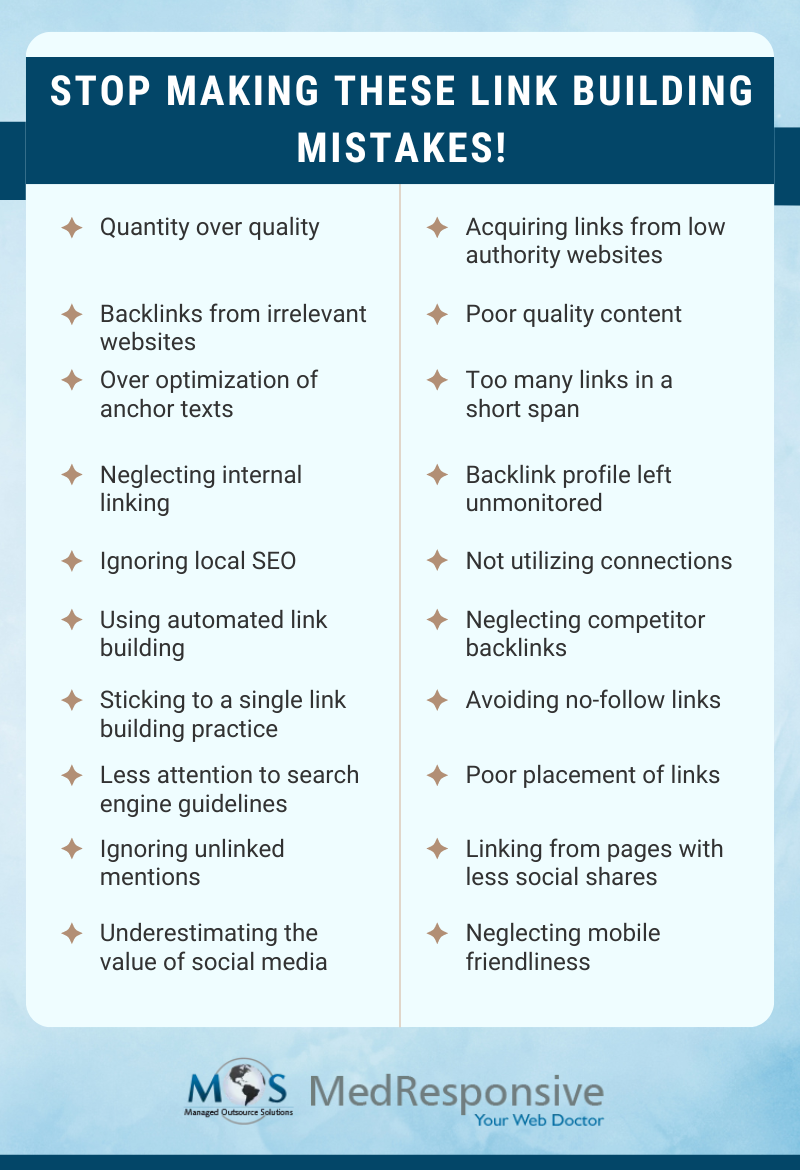Link building is no small business. It takes enormous planning and execution to achieve the target of boosting your site’s authority and ranking. Why is it important to handle the process with such caution? The answer is the consequences a bad quality link would create, ranging from declining site traffic, to google or any given search engine penalizing your site. Professional SEO services help the link building process giving no room for shortfall, ultimately guaranteeing better visibility and trustworthiness on the web. Here, we’ll discuss some of the common link building mistakes websites tend to make and some strategies to avoid them.

Link Building: Common Mistakes to Avoid
The key to ensure a high SERP ranking and better web traffic is to avoid all possible mistakes while building a link. Below given are some of them.
- Quantity over quality? Not a good idea
Stuffing countless backlinks into your website does not do any good. Always remember to prefer quality over quantity. One must solely focus on acquiring high quality backlinks from authorized websites, as the outcome of numerous low-quality links is a decline in the ranking. You should also ensure that the secured backlinks are devoid of plagiarism.
- Backlinks from irrelevant websites
Always address the question of user intent before acquiring links from any website. This helps to track and distinguish the relevant and irrelevant ones. Stick to the websites related to your niche as links from unrelated websites would affect the credibility. A website about soccer must not acquire backlinks from a literature website as this might confuse the search engine. Guest-posting must be promoted keeping the key points of relevance in mind.
- Over optimization of anchor texts
A good anchor text helps google algorithm understand the structure of the site. But over optimization of anchor texts could only do worse. Using the exact keyword in every anchor text is considered as an attempt of ranking manipulation. Instead of repetition, use diverse anchor texts related to the content. This could be incorporated by using relevant synonyms, branded anchor texts and natural language phrases.
- Neglecting internal linking
Internal links connect the different webpages of the same website. Internal links are as important as external backlinks as it can divert page authority to important pages as well as elevate the web crawling process, ultimately resulting in better optimization.
- Ignoring local SEO
Businesses and websites targeting a local audience could improve their visibility free of cost by using the technique of local SEO. Local optimization of links will penetrate more into the target audience along with attracting new ones. This will help websites related to real estate, medical services, retail stores etc. improve their conversion rate.
- Using automated link building
Relying on automated link building tools would only create unnatural link profile. Such tools tend to create over optimized links with no room for personalization. This method is frequently misused when other websites are spammed with link requests. It is therefore better to use manual methods instead of automated link building techniques.
- Acquiring links from low authority websites
Acquiring links from low authority domains and no-index pages would disrupt the ranking process. Third party tools like Ahrefs, SEMRush or Moz could be used to check the authority of any website before securing links.
- Poor quality content
What is the deal of creating good quality links for a content not link-worthy? Relevant content is also key to better ranking, as it is for links. User-generated content with infographics, case studies, statistics, surveys etc. must be focused on. Quality must be prioritized along with staying informative and engaging.
- Too many links in a short span
In order for quick and better optimization, many businesses tend to build numerous links within a very short span of time. Search engines like google consider this a shady practice, resulting in declined rankings and penalties.
- Backlink profile left unmonitored
Monitoring backlink profile would help track any changes in the backlinks. It helps identify any lost or broken links and thereby reclaim them fast. Any intrusion of toxic or spam links could be identified to take further steps. It is important to regain the lost links of high quality which otherwise would affect the ranking. SEO tools like Ahrefs, SEMRush or Moz help the audit process.
- Not utilizing connections
Connections in the industry always act in favour of gaining valuable backlinks. Create a network including industry webmasters, companies and other brands to widen the possibility of securing quality links. Partnerships with other trusted websites also seem beneficial for both the parties.
- Neglecting competitor backlinks
Analyze other top-ranked competitor websites to weave your own effective strategies. It helps to fix the loopholes in your own website along with finding any missed-out relevant websites to acquire backlinks from them.
- Sticking to a single link building practice
Monotonous link building methods isn’t a recommended strategy. Incorporating diversity will indirectly boost the website ranking. Some of the various link building practices that can be adopted include natural link acquisition, manual outreach, guest blogging, commenting etc.
- Avoiding no-follow links
No-follow links are as important as do-follow links. Though not directly impacting, they can in fact affect the ranking in future due to their potential to drive web traffic. Additionally, they could navigate to do-follow links which in turn affects the ranking.
- Less attention to search engine guidelines
Paying websites to acquire links is considered a manipulative practice, breaking the guidelines, leading to actions like penalty. It is important to follow the guidelines as well as check for updates as they may change any moment. Staying less updated might lead to unintentional manipulations and subsequent consequences.
- Poor placement of links
It is editorially preferred to place the links in the written section of an article or blog than in a comment/ forum. Though commenting isn’t a bad practice, better rankings are assured more through the placement in the main sections.
- Ignoring unlinked mentions
It might happen that your website or brand is mentioned but unlinked at times. Such situations can be tackled by reaching out to the site owner with the help of monitoring tools like Talkwalker, Critical Mention or BuzzSumo among others.
- Linking from pages with less social shares
Acquiring links from websites with less shares or no shares at all is a worthless attempt. Conduct statistical studies to determine whether the website is worth acquiring the link before proceeding for better time management.
- Underestimating the value of social media
Social media has enormous powers to gain you partnership opportunities, relevant backlinks and new customers. Make use of tactics like interactions,infographics, multimedia content etc. to boost exposure, engagement and visibility.
- Neglecting mobile friendliness
While building a link as well as modifying the website, try to incorporate a device-friendly nature as users tend to access them from diverse devices. This improves the visibility along with user experience.
Link building is essential for your content to be marked reputable and valuable. A search engine optimization company helps you with the complexities of link building, cautious of the mistakes and considerate of the strategies. A good link is the key to a well-organized website being seen by the target audience. Proper link building is the formula for top-notch ranking and solidity.




